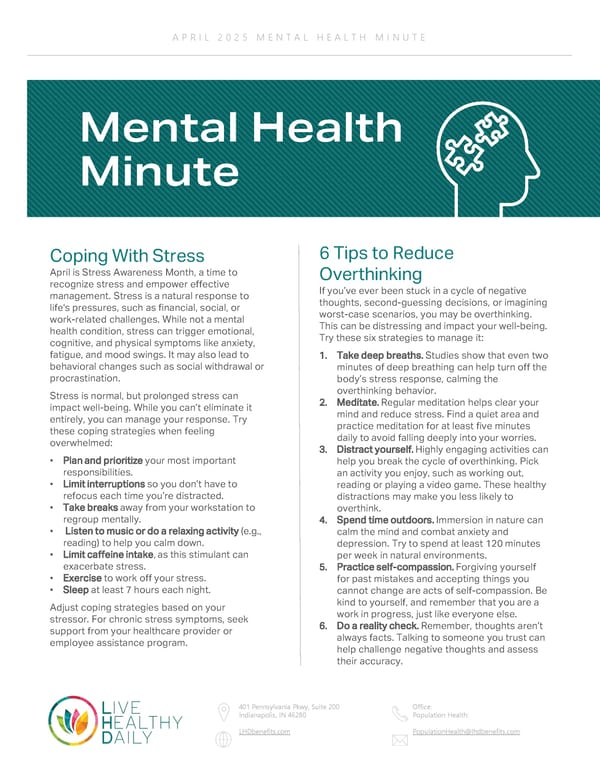Tips to Reduce Overthinking
A P R I L 2 0 2 5 M E N T A L H E A L T H M I N U T E Mental Health Minute Coping With Stress April is Stress Awareness Month, a time to recognize stress and empower effective management. Stress is a natural response to life's pressures, such as financial, social, or work-related challenges. While not a mental health condition, stress can trigger emotional, cognitive, and physical symptoms like anxiety, fatigue, and mood swings. It may also lead to behavioral changes such as social withdrawal or procrastination. Stress is normal, but prolonged stress can impact well-being. While you can’t eliminate it entirely, you can manage your response. Try these coping strategies when feeling overwhelmed: • Plan and prioritize your most important responsibilities. • Limit interruptions so you don’t have to refocus each time you’re distracted. • Take breaks away from your workstation to regroup mentally. • Listen to music or do a relaxing activity (e.g., reading) to help you calm down. • Limit caffeine intake, as this stimulant can exacerbate stress. • Exercise to work off your stress. • Sleep at least 7 hours each night. Adjust coping strategies based on your stressor. For chronic stress symptoms, seek support from your healthcare provider or employee assistance program. 401 Pennsylvania Pkwy, Suite 200 Indianapolis, IN 46280 LHDbenefits.com Office: Population Health: [email protected] 6 Tips to Reduce Overthinking If you’ve ever been stuck in a cycle of negative thoughts, second-guessing decisions, or imagining worst-case scenarios, you may be overthinking. This can be distressing and impact your well-being. Try these six strategies to manage it: 1. Take deep breaths. Studies show that even two minutes of deep breathing can help turn off the body’s stress response, calming the overthinking behavior. 2. Meditate. Regular meditation helps clear your mind and reduce stress. Find a quiet area and practice meditation for at least five minutes daily to avoid falling deeply into your worries. 3. Distract yourself. Highly engaging activities can help you break the cycle of overthinking. Pick an activity you enjoy, such as working out, reading or playing a video game. These healthy distractions may make you less likely to overthink. 4. Spend time outdoors. Immersion in nature can calm the mind and combat anxiety and depression. Try to spend at least 120 minutes per week in natural environments. 5. Practice self-compassion. Forgiving yourself for past mistakes and accepting things you cannot change are acts of self-compassion. Be kind to yourself, and remember that you are a work in progress, just like everyone else. 6. Do a reality check. Remember, thoughts aren’t always facts. Talking to someone you trust can help challenge negative thoughts and assess their accuracy.
 Tips to Reduce Overthinking
Tips to Reduce Overthinking 